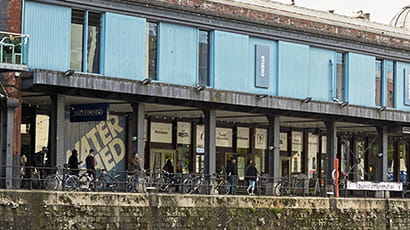Putting Bristol on the map as a City of Film
From celebrating Bristol’s filmic credentials to highlighting the role of freelancers in the creative industries, UWE Bristol research has boosted the city’s cultural and economic health. So much so that UNESCO was inspired to designate Bristol a City of Film.
University experts in filmmaking, creative enterprise and cultural production led a series of projects that explored the Bristolian roots of Hollywood actor Cary Grant, analysed Bristol’s development as the UK’s third largest film and television production centre, and documented the role of freelancers in television and film.

Screen tourism and creative culture
In October 2017, Bristol became a UNESCO City of Film. This bid, led by Bristol City Council, was initiated by Dr Charlotte Crofts in 2014. One of the key outcomes has been the Council’s £50,000 commitment to cultural activity and four years of funding from the Paul Hamlyn Foundation for a film literacy project across Bristol, Belfast and Bradford.
The UNESCO designation was pivotal to Channel 4’s decision to locate one of its two regional hubs in the city, a decision that was based on UWE Bristol’s Go West: Bristol’s Film and Television Industries, written by Professor Andrew Spicer and Dr Steve Presence. This research report drew on survey data and interviews with company executives, to demonstrate Bristol’s strengths as the UK’s third largest centre for screen industry production. It revealed the centrality of the BBC’s Natural History Unit and Aardman Animations, which had stimulated a vibrant cluster of over 160 independent screen producers. The study recommended the need for a coherent screen strategy to lobby policy makers and government to provide greater support for the industry.
Further impetus for policy change was provided by Dr Amy Genders’ research into the role of freelancers in Bristol’s screen economy and culture. Dr Genders demonstrated the precariousness of freelancers and their invisibility in economic analyses, resulting in their being ignored in policy decisions. Her research not only changed perceptions of freelancers as an “invisible army” integral to the industry, but was also put forward as evidence to the House of Lords Communications Select Committee by The Indie Club, an advocacy pressure group for independent producers and freelancers. This prompted calls for freelancers to be recognised as a vital workforce.
Helping to increase international awareness of Bristol’s cinematic roots, Dr Charlotte Crofts’ research on local cinema history led to the ‘Cary Comes Home Festival’. The biennial event continues to attract fans and global audiences. The research also influenced both the Watershed’s ‘Cinema Rediscovered Festival’, a festival dedicated to classic cinema, but also the British Film Institute’s 2019 Cary Grant Season.
The Watershed, the South West’s leading film culture and digital media centre, also benefited from the UNESCO designation, which it used to secure funding and international support, while UWE Bristol research continues to inform the Council’s wider cultural policy.
Artwork by Bristol Ideas: Willem Hempson.

Contribution to the UN 2030 sustainable development goals
UWE Bristol is proud to align our research to the UN sustainable development goals. The above research aligns with the following goals:
Breaking research boundaries
We’re tackling the big issues of today and tomorrow head on. This is big, brave thinking for a better future. It’s research done well. Research with the power to transform lives, transform the future.
Breaking research boundariesYou may also be interested in

Research in the School of Arts
Research in the School of Arts maintains our established reputation, nationally and internationally, across a range of disciplines.

Digital Cultures Research Centre (DCRC)
The Digital Cultures Research Centre (DCRC) is a loose-knit, collaborative and anti-disciplinary network of researchers distributed across UWE Bristol.

Moving Image Research Group (MIRG)
The Moving Image Research Group focuses on historical, theoretical and practice-based research into film cultures, production and education.

